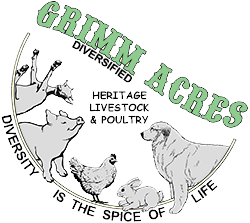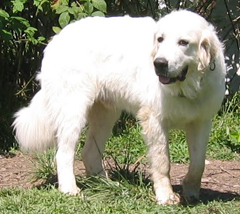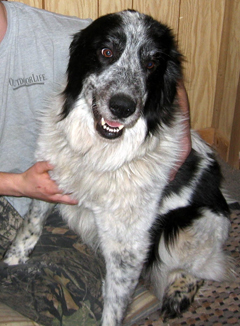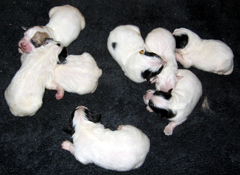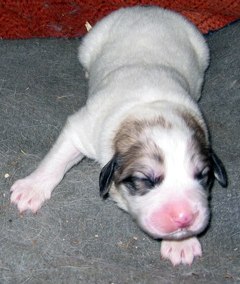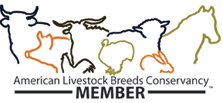Great Pyrenees Guard Dogs For Sale
To Purchase our Dogs: Contact us for availability.
Our first "guard" animal was (and still is) a donkey named Toby. Toby is a good ol' boy. He has proved great company for the goats, and gets along well with the cattle. But Toby just really never cared one way or the other about the chickens. The foxes would come and go, taking a chicken or two nearly every day, and Toby paid little to no attention at all.
We purchased a female Great Pyrenees puppy and by the time she was 8 months old our losses to the foxes were almost zero. The Pyrs seem to have a strong sense of ownership; ownership of property, everything living on the property, and the people that live and frequent there. Ours will attack blackbirds and squirrels, but don't bother the chickens. They chase off deer, but sleep with the goats. We have raised our dogs to be very friendly to visitors. While they bark at anyone new, they are equally quick to come up for a good head petting as soon as we appear welcoming.
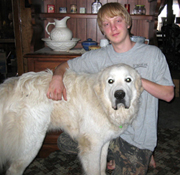
Historically it is suggested that the Great Pyrenees originated in Central Asia or even Siberia and followed the Aryan migration into Europe. The breed is named for the Pyrenees mountain range in southern France and northern Spain, where they are still used to guard flocks of sheep and goats on the steep slopes. The Pyrenees was also considered a beautiful and valuable dog by the local nobility. They were appointed French court dog in the 17th century.
Pyrenees are large, and require a lot of exercise. They are generally sleep most of the day and are most active at night although our stud, Bradley, spends a lot of time in the house and yard and sleeps quietly at the foot of our bed most nights.
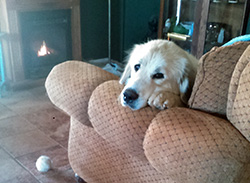
We currently breed fully AKC Registered Pyrenees, focusing on temperament, guarding behavior, and physical breed standards. Our puppies are raised along side of chickens and other poultry, playing with goat kids and baby pigs as soon as they (the pups) can walk. Although we have sold several puppies as pets, they are magnificent working dogs that thrive in the working environment. In fact, if you are considering a Pyrenees for a pet take a moment to look at the Pyrenees Rescue in your area. Many rescued Pyrenees are incredibly loving dogs just needing a chance to become part of your family. The biggest concern good breeders have is ensuring that their puppies find good forever homes and are not used to reproduce puppies that will be unwanted and unloved.

If you are looking for a guardian animal for livestock and/or poultry that will also become a part of your family, a well-bred Pyrenees may be the perfect match. Rescued Pyrs are usually not used as livestock dogs since there is no way of knowing how the dog was socialized to animals as a pup and so how it will react to your valuable livestock.
These are large dogs that require attention to their coat on a regular basis, especially if you will be bringing them inside on occasion as we do.
They require some escape from the heat of summer including shade and possibly a pool of water, but LOVE the winter months especially when it brings snow.
As a breed, the Pyrenees is considered to be a healthy breed, relatively free of many of the problems that affect some other breeds. But, of course, there are problems which can appear in even the most carefully bred puppies. These are large dogs, considered one of the giant breeds, and can be susceptible to bone and joint problems.
Hip Dysplasia
This serious degenerative joint disease is most common in large and giant breeds of dogs like the Great Pyrenees, but it can also affect medium-sized breeds and even small breeds.
Our breeding dogs have their hips x-rayed at two years to clear them of any hip problems.
A risk factor for joint problems is excess gain, especially during the fast growth period from three to ten months. Too much weight can put too much stress on the joints. Obesity is always bad for Pyrs, but is especially damaging to a Pyr who is genetically predisposed to hip dysplasia.
Another serious risk factor seems to be excessive exercise while the dog is still a puppy.
It is extremely important for puppies to have adequate rest and mild to moderate exercise with supervision.
Here are some guidelines I have found and agree with:
- When you take your puppy home, supervise his play so he does not become over tired, - he is still a baby !
- Do not let him jump down steps or out of a vehicle - this strains his shoulders and front assembly.
- Keep him secured in a suitable cage while traveling.
- Don't let him run and slide on a slippery indoor surface on which he can't gain traction.
- No unsupervised playing with adult dogs - be sure you are right there beside him. This also applies to puppies playing with children.
- Avoid long tiring walks on a leash. A very short walk will suffice for lead training and accustom him to walking by your side and not pulling out in front.
- Do prevent too rapid growth by not over feeding him. He should look slim and trim!
- Do not be afraid to "make a pet of" your livestock guardian dog. We find that, although all of our Pyrenees would love to spend an evening on the living room rug 'watching TV', they are always glad to be back out in the pastures running the fence lines and protecting their "flerd". Socialization makes them safer around visitors, and much easier to handle when Vet care is required.
Our current breeding AKC registered female, is Molly. She is sweet and loving but more interested in "her" goats than hanging out with her people. Our newest addition is a lovely AKC Registered female name Floie, short for Florence Nightingale, who we hope to breed next year.
